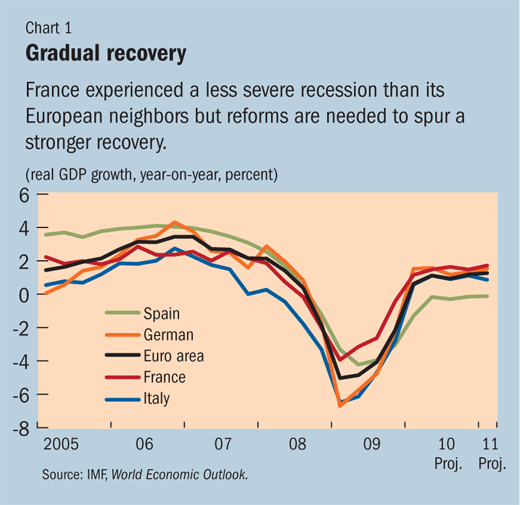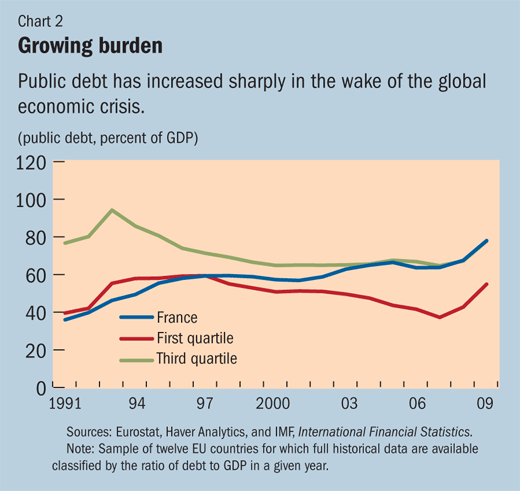
Typical street scene in Santa Ana, El Salvador. (Photo: iStock)
IMF Survey: France: Recovering Well But Public Debt a Challenge
July 30, 2010
- Recovery under way, tested by recent turmoil in Europe
- Challenge is to restore sound public finances while protecting growth
- Regulatory and supervisory reforms to reinforce financial system
Although the recovery is well under way, the outlook for the French economy remains uncertain, clouded by lingering concerns about the European sovereign debt crisis and possible spillovers in the euro area as well as domestic policy challenges.

Engineer at work in Toulouse. A gradual recovery is under way in France, with the IMF predicting growth of 1.4 percent in 2010 (photo: Newscom)
ECONOMIC HEALTH CHECK
The IMF projects the French economy will grow by 1.4 percent in 2010 and 1.6 percent in 2011. While the recovery would be somewhat faster than in the euro area as a whole (see Chart 1), persistently high unemployment and imminent fiscal consolidation in France and its main trading partners will weigh on demand, despite some relief from the recent depreciation of the euro.

Early rebound
France weathered the “great recession” better than most of its peers and was among the first countries to see a rebound. Benefiting from its fairly resilient financial sector, large social safety nets, timely and decisive government intervention, and with a comparatively less open economy, France had a less severe recession than the euro area as a whole and exited the recession in the second quarter of 2009.
Policies are now shifting from managing the crisis to strengthening the foundations of the economy. Following through on the authorities’ commitment to fiscal consolidation, further strengthening financial stability, and implementing growth-oriented structural reforms should lead to a stronger and sustainable recovery, IMF economists say.
Restoring fiscal sustainability
The financial crisis and economic downturn have taken a significant toll on public finances. While the fiscal stimulus in 2009-10 has been appropriate and helped cushion the downturn, the impact of the recession on the fiscal balance has worsened the already challenging debt situation associated with mounting aging-related spending pressures. The general government deficit rose significantly to 7 percent of GDP and the general government gross debt reached about 78 percent of GDP in 2009 (see Chart 2).

Against the backdrop of the sharply increased public debt and the turbulence in European financial markets, a well-designed fiscal consolidation plan is needed to place public finances on a sustainable path. France must now focus on achieving its objective under the Stability and Growth Pact of reducing the overall fiscal deficit to 3 percent of GDP by 2013, which is crucial to anchor expectations and avoid an unsustainable debt dynamics. Keenly aware of this, the authorities have recently announced a raft of fiscal consolidation measures. These measures, once legislated and implemented, are sizeable and envisage the participation of all levels of government in fiscal consolidation.
To safeguard fiscal sustainability without jeopardizing the recovery, the adjustment efforts need to focus on measures that have the least detrimental impact on economic activity such as entitlement reforms in the pension and healthcare systems. In this regard, the recently announced major and difficult pension reform aims to reduce the deficit of the pension system over time and rightly emphasizes an increase in the effective retirement age by gradually raising the legal retirement age from 60 to 62 years and the legal minimum age of full pension entitlement from 65 to 67 years.
However, more needs to be done to achieve the medium-term fiscal objectives. The consolidation should be based on realistic macroeconomic forecasts and its credibility would be enhanced by an appropriate fiscal rule. Besides expenditure constraint of the central government and social security, it is important to maintain efforts currently underway to control local government spending.
Meeting new financial stability challenges
French banks are emerging relatively stronger from the global financial crisis and have largely exited from crisis-related state support. The policy response to the financial crisis succeeded in stabilizing the financial system. French banks reported improving profitability and significantly shored up capital adequacy ratios with Tier 1 capital ratio rising from 8.7 in 2008 to 10.2 in 2009, above the euro area average of 9.1.
Nonetheless, banks face new risks posed by the fragile recovery and concerns about European sovereign debt. Private credit growth has remained sluggish, especially in the corporate sector, but it appears that this is being driven more by depressed credit demand than by short supply. Nonperforming loans have risen and weak growth may put further pressure on loan quality. In addition, funding pressures could intensify in the event of continuing European turbulence.
The newly released EU-wide stress test results have confirmed the resilience of French banks. The four major banking groups participating in the stress test represent about 80 percent of the French banking system. All French banks passed the test and showed a strong capacity to withstand the assumed level of stress. The publication of the stress test results and the full disclosure of the sovereign exposure of French banks are steps towards improving transparency and communication, which may help the market’s assessment of the French financial system.
In response to the need for systemic supervision, France has reformed its national supervisory arrangements and is playing an active role in promoting international regulatory reform. The reform has progressed well with the new supervisory structure unifying banking and insurance and strengthening consumer protection. It is now crucial to set up the national systemic risk board to enable close cooperation with the envisaged European Systemic Risk Board. In light of sweeping global regulatory initiatives and their implications, France should remain engaged in the international regulatory reform process and actively participate in ongoing macroeconomic impact studies and follow-up work to refine the current reform proposals.
Pushing ahead with structural reforms
Implementing fully the authorities’ ambitious structural reform agenda is essential for recouping the output loss during the recession and strengthening the recovery. To make the French economy more competitive and benefit more from the expansion in world trade, it is critical to put renewed emphasis on measures that could moderate wage costs, increase competition, and promote innovation.
In view of the considerable growth impact, it is urgent to focus on job creation and improving market efficiency. In addition to labor market activation and training policies, France should continue minimum wage moderation to gradually establish a motivating pay scale for young and low-skilled workers. For senior workers, efforts to improve incentives for continued work, including effective job-search requirements, need to be pursued in tandem with the pension reform. Further deregulation of product markets would enhance economic efficiency and raise welfare. The EU Services Directive should be followed to achieve further liberalization, including in professional services.


